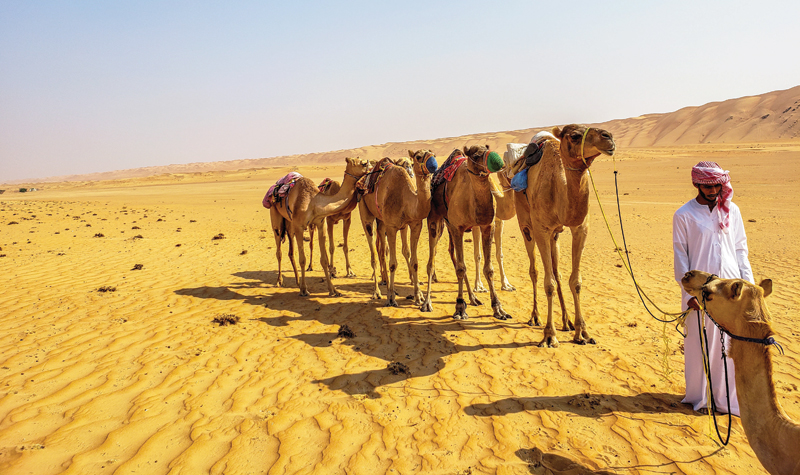

AN environmental protection officer from Cranbrook, British Columbia, was overwhelmed after his visit to the Al Wusta Wildlife Reserve. Ross Blake admits having a life time experience at the wildlife reserve. The friendly hospitality of Omanis enthused him no end as love for plant and animals led him to discover more.
The visit was a huge contrast for this Australian/Canadian who works in a small town in the Rocky Mountains, surrounded by picturesque snow-capped mountains and wildlife.

Ross and his wife Britany visited the Arabian Oryx Project at the Wildlife Reserve as part of their first-ever trip and learnt about the reintroduction project that enjoys considerable success which steadily increased the antelope’s numbers.
He learnt the Reserve achieved success in breeding and the facility serves as an educational centre for tourists and an educational outreach for the locals and why Oryx needs to be protected and not hunted.
Ross also discussed the genetics and testing to ensure the animals maintain genetic diversity, not to be inbred, which is hard when the original stock comes from a small number of animals. He was informed about the great deal of testing and went through a number of scientific papers outlining its success.
Sami al Rahbi, the host, and one of the biologists at the reserve, explained to them the breeding programmes for Oryx, sand gazelle and mountain gazelle. They discussed issues regarding biological concerns, impact and education. They also explored the reserve and learnt the varying geology along with fossilised remains and glacial scars. They were also lucky enough to witness the first Oryx calf of the season.
Ross fortunate to live in countries with amazing wildlife and travels to countries having unique species. His love of animals has led him to try wildlife photography as a hobby.

The couple visited Wadi al Khlata and saw Al Khlata glacial deposits. Fossilized remains of trees are intact, a rare in the world due to the past landscape not being a desert.
Their drive to Duqm via Ras al Madrakah got them photos of camels and fishermen along the route. At the Duqm Rock Garden limestone and sandstone structures amazed them. At the Ras Al Jinz Turtle Reserve they saw the landscape change from rocky desert to rolling sand dunes. Seeing endangered green turtles lay eggs on the beach was an ‘unforgettable experience’ and to see baby hatchlings make its dangerous journey to the ocean was amazing.
Ross says while ecotourism is an important tool in education, which needs to be balanced between ecology and tourism.
Many turtle beaches around the world do not let the public anywhere near the beach, only allowing scientists to do research. Ross says this provides a better environment for animals, and a ‘true’ representation of nature. But this also does not help educate the public in a way that seeing animals with their own habitat would.
Tourists at the Turtle Reserve get to see one of the most endangered species of turtles, eggs being laid and baby turtles hatching, as well as the dangers that babies face. “What we saw was tourists learning and respecting turtles and understanding the reason for protection in a way that a book or TV shows would not be able to capture,” he muses.
The couple also drove to Bidiya and enjoyed a two-day camel ride in Rimal al Sharqiya with a local safari company and tasted fresh camel milk. At Sur, they visited a dhow factory and saw boats being built using traditional techniques. They brought a small dhow as a memento and took it to Canada. During their visit to Wadi Shab they were instantly surrounded by inquisitive goats.
At Bimmah Sinkhole, they enjoyed swimming and cliff diving with the local boys. “We climbed the cliff to jump off a few times, and swam along the edges, studying the unique rocks,” he adds. They got natural spa treatment when shoals of little fish swam over their feet eating the dead skin. Later, they drove through the mountain highway going around tight hairpin bends to see the beautiful skyline of Muscat at night.
Britany who experienced her first camel in the wild in Adam says Oman opened her eyes to numerous new cultures, as it was her maiden trip to the Middle East.
She experienced amazing hospitality from the city all the way to Bedouin families in the desert.
“Never in my wildest dreams did I believe the desert could be so beautiful in so many ways, and not just an empty vast expanse. I have developed an obsession with amazing dates and I love the many varieties available.”
Ross fell in love with Omani kahwa, halwa and kunifeh dessert. Caffeinated Bacon from his favourite TV show Futurama where the main character goes into the future and discovers all the weird food is his profile picture on Instagram.
Ross majored in Zoology and later worked in Saudi Arabia and Kuwait but always desired to visit Oman. He loves to come back and visit Salalah for his birthday next year and experience the mountains and dive with the whales and dolphins. Otherwise he hopes to visit Brazil next year to photograph the rich fauna in the Amazon.
Oman Observer is now on the WhatsApp channel. Click here



